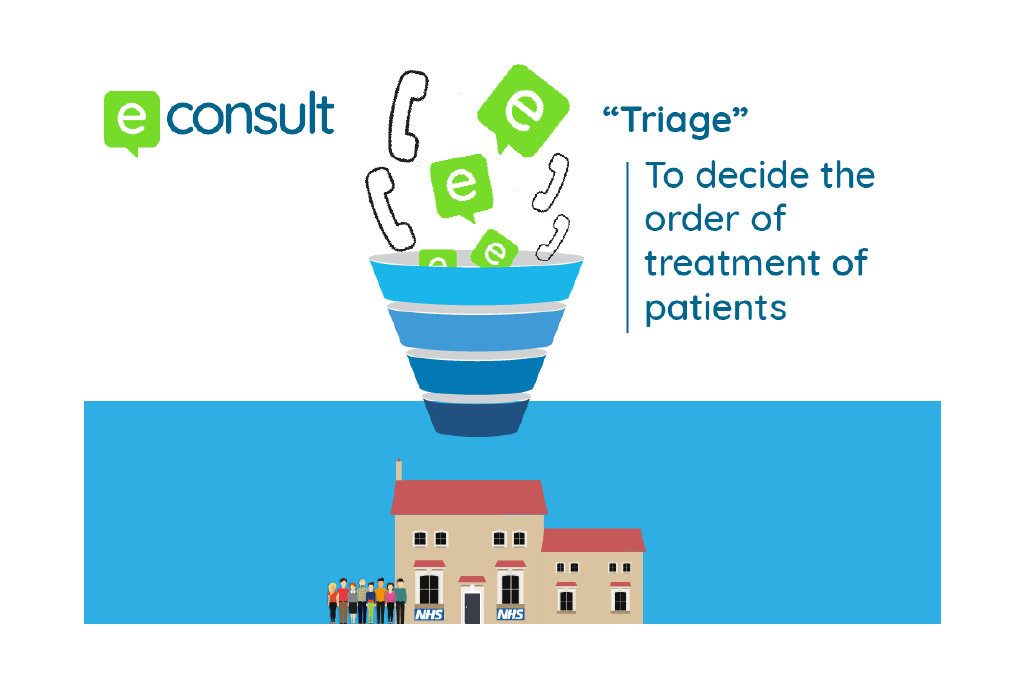What is triage and why is it important?

To decide the order of treatment of patients
Triage: Definition from Oxford Languages
Every day, GP practices receive requests for help or advice through patients calling in, walking in, and now also online via online consultations. For each patient request, the practice needs to work out:
- Why they have sought help from their GP
- What kind of help the patient needs
- How quickly the patient needs help
- Who is the best person to help this patient
- Where and when the patient should be seen
The answers to these questions help the practice to sort patients based on their needs. This process is called triage. Triaging is essential when you may be dealing with hundreds of patients a day, all with different needs, requests and health backgrounds.
Why is triage important?
When we feel unwell we often want reassurance and advice about our symptoms, but might not know exactly what is wrong with us or how to treat it. Not every request can be dealt with by a GP practice, not every condition is right to be seen at A&E, and Dr Google (or the internet) will often lead you to think you have something you do not. Medical professionals spend years training and are the experts when it comes to making sure patients get the right care.
Regardless of whether you look online first, there are times when you know you need help from a medical professional, such as a doctor or pharmacist. You then have to decide where to go and which healthcare professional is right for you. As a patient, how are you to know? Do you go to your GP, pharmacist, out of hours service or an A&E department? The list goes on.
When you finally decide which healthcare service you think you need, you explain why you are there and are asked about how you are feeling. You are then given care or you might be told a different healthcare professional is best placed to help you.
With large numbers of patients to look after (some GP practices have over 40,000 patients registered at them), it is essential to triage and sort each patient to the right type of care. It might seem convenient to book an appointment with a GP for when you have time, but if an appointment is not the right care for you, then it is not a good use of your or the doctor’s time.
How can online consultations help GP practices triage patients?
Online consultations allow a patient to submit their request whenever they need to. There is no need to wait in a phone queue, travel to the practice or wait until the practice is open. The request will be sent to the practice, with answers that may suggest something serious highlighted. The information provided allows the practice to triage each patient. This also means the right person can help you, based on the nature of your request. For example, the administrative team responds to admin requests, nurses, GPs and other clinicians respond to patients appropriate for the type of care or treatment they need.
Patients can do all of this from home, on their computer, phone or tablet. Rather than having to guess which healthcare option would be right for them, they can go online, submit an eConsult and wait for a clinician to tell them.
eConsult has ‘red-flagging’ built-in. If you answer questions that suggest your condition is more critical than can be seen at a GP practice, you will be stopped and advised to seek more critical care.
Triage can also help patients get to the right care more quickly

As mentioned above, there are a multitude of different healthcare options available to patients. Knowing which one you should go to can be difficult, especially when you are feeling unwell. By completing an online triage, through a platform like eConsult, you can wait at home or continue to go about your day, safe in the knowledge a trained healthcare professional is reviewing your submission and will let you know what care you need.
What about patients who can’t use online consultations?
There will always be patients who can’t use online consultations for whatever reason. Submitting an online consultation is not the only way to contact a GP practice and a practice still has to triage phone requests and walk-in requests. However, if more patients go online to contact their GP practice, it will mean more traditional forms (such as telephone or walk-in) will be reserved for patients who don’t have online access.
You can compare online consultations at your doctors to banking. Many people now use online banking, but there are still branches open for those who cannot use a banking app on their mobile phones or don’t have online access.
Understand how your GP practice works
It’s important to understand how a GP practice works. As a patient, you are one of many the practice looks after and the doctors have to prioritise who should be seen first. Due to the detailed history taken by eConsult, your practice has all the information they need to ‘triage’ you without you having to phone up the practice or come in. eConsult is now available in over 3,000 NHS GP practices throughout the UK.
Next time you need to contact your GP, why not try an online eConsultation first?